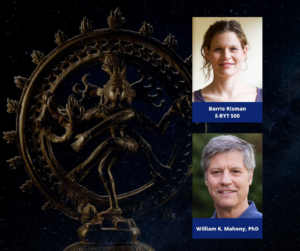
Expansion in Four Directions by Max Bill
by Barrie
A basic paradox you might encounter when studying yoga philosophy, particularly during times of change and uncertainty like the one we’re going through now, is the notion of finding freedom and expansion in what feels limiting and challenging. How do you do that in an authentic way that doesn’t deny or bypass the challenges you are experiencing but rather helps you to reframe how you understand and approach them? How can you use the wisdom of yoga to gain a more liberating perspective on your life and the world, and in doing so, find a pathway forward that feels affirming? These were some of the questions I have been pondering lately as I have considered how yoga philosophy has supported me over the past 18 months.
Here is an example. A few months ago, I had a serious conflict with several members of my community over what I felt were life and death issues. My exchanges with those community members were uncomfortable, and even though I knew I was making the right decision in taking actions they did not agree with, I was left with feelings of judgement that weighed on me.
I realized that while it was important to use my discernment in making a responsible decision, there was no point in holding on to my resentment for the other people. I understood that those feelings were only draining me, not impacting the other people. But I still found it hard to let these feelings go and I wanted to shift that.
So I contemplated the quality of upeksha, or upekkha, which is the state of equanimity or even-mindedness that both the yoga and Buddhist traditions uphold as an essential virtue to cultivate in fostering contentment amidst the complexities of life. Vietnamese Buddhist teacher Thich Nhat Hanh describes it this way:
You climb the mountain to be able to look over the whole situation, not bound by one side or the other. —Thich Nhat Hanh, The Heart of the Buddha’s Teaching
Upeksha doesn’t mean indifference, and it doesn’t mean you don’t care or that you don’t take a stand. Rather, it means that as you hold onto your own viewpoint, you are also able to step back and look at the whole situation from a place of healthy detachment. You are not denying the challenge you are facing, but you are not bound by it.
As I contemplated upeksha, I began by articulating all the things about the situation that were still bothering me. Then, I imagined myself standing on a mountaintop looking down on this situation from a distance. In my mind’s eye, I saw myself and the other people, each of us acting in ways that we felt were right. I experienced a sense of inner spaciousness that included me and them. With my exhalations, I inwardly released the resentment I was harboring toward them. As I did this, I pictured all of us continuing with our lives, free from feelings of judgement. While I still didn’t agree with their views, I felt lighter, freer, and more expansive as a result of this visualization on letting go.
I think this story illustrates just one of the many ways that yogic teachings can support us in navigating challenging situations by reorienting how we understand and experience them, which can ultimately give us greater agency and freedom in how we wish to respond.
If you’re interested in learning more about how yoga can support you in navigating the complexities and challenges of this time, Professor of Religious Studies William Mahony, Ph.D., and I will be teaching a new 21-day course in contemplative study called “The Vibrant Heart: Lessons from Nondual Tantra on Expansive Living in Challenging Times” that is designed to make the wisdom of the Nondual Tantric tradition accessible, relatable, and above all, relevant to our lives right now. It includes talks, guided inquiry, postural practice, live Q&A, and more.
Whether you are brand new to yogic study or a seasoned contemplator, I’m confident you’ll find precious and timely guidance in these teachings that have brought hope, meaning, and encouragement to countless seekers. The course begins November 1. Find out more and sign up here.

Download Barrie’s free Guide to Home Yoga Practice right here. Learn more about her book Evolving Your Yoga: Ten Principles for Enlightened Practice and her online classes at www.barrierisman.com.
Follow Yoga for Healthy Aging on Facebook ° To order Yoga for Healthy Aging: A Guide to Lifelong Well-Being, go to Amazon, Shambhala, Indie Bound or your local bookstore.


Leave A Comment